Viennese for beginners
Were you accepted for your Erasmus exchange in Vienna? Or have you decided to attend a language course in Vienna, in order to improve your German? Well, it doesn't matter why you are coming to Vienna, since as long as it is related to improving your knowledge on the German language, you could have a little problem. Although in Vienna and in Austria in general German is spoken as an official language, when it comes to daily use it is possible to come across terms completely different from the German ones.
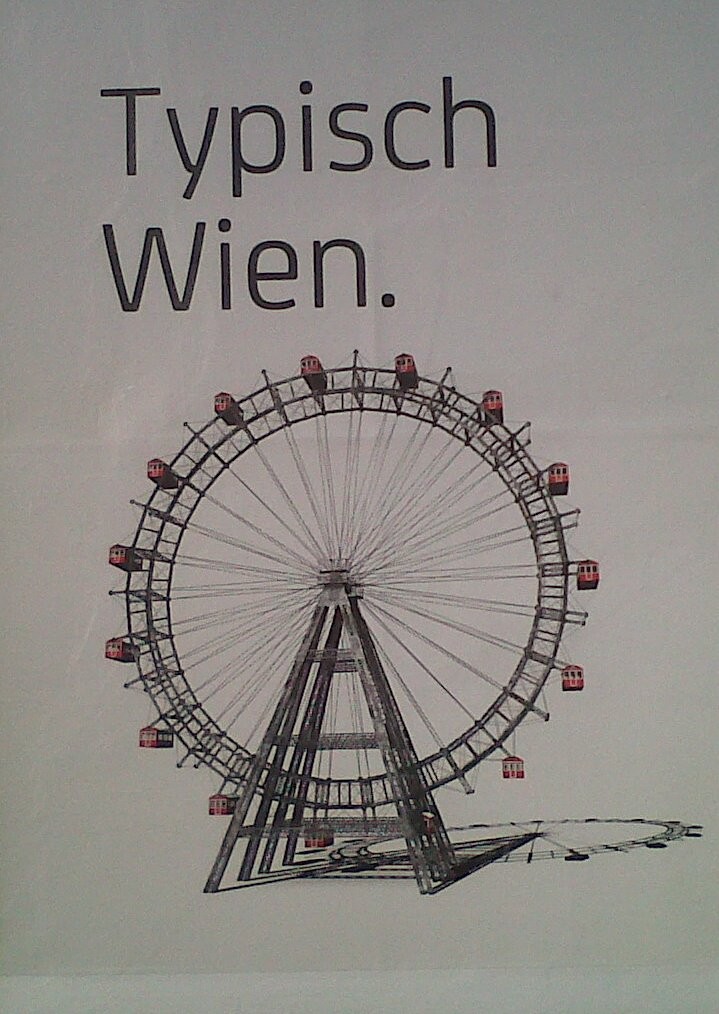
Advertising poster with the Viennese Ferris Wheel (Source)
However, there's no need to worry, since nowadays most of the people speak perfect (or almost) standard German, particularly the young ones. You will be able to communicate easily as soon as you let people know that you are foreigners (by the way, that's also valid for Germans). If you end up going out with a Viennese I can assure you though that it's quite difficult to get used to their "Schmäh" (their humor, sarcasm, way of being).
In order to make your introduction into the Viennese society easier, in this article I'm presenting you some terms you will make use of in your everyday life. A little tip: if you not only learn these terms, but are also capable of using them on your own, when you go out you will see how much easier it will be for you to deal with the people.
1. Greetings
When it comes to greeting formulas in Vienna the expression "Grüß Gott" is the one generally used. I know it sounds odd at the beginning, but it has nothing to do with religions or beliefs (at least not anymore). This expression is used predominantly when one wants to address people in a formal way (using "Sie" in German), or when one doesn't want to address someone directly. When entering for instance in a restaurant or a shop, "Grüß Gott" is used as a courtesy form rather than for example "Guten Tag". The latter one is naturally understood by everybody, but it's not usual among Viennese.
To those whom you don't want to address formally (i. e. using "du"), you can simply say "hallo". When it comes to friends and casual company, one can also say "Servas" (Viennese form for the Bavarian "Servus), "Seas" or "Griaß di", although you are not supposed to. As aforementioned, "hallo" is used in Vienna on a regular basis.
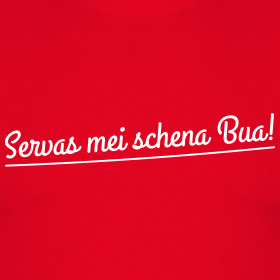
"Hallo mein schöner Bub! "
2. Goodbyes
Obviously everybody understands "Auf Wiedersehen", but it sounds somehow stiff and uptight, and if there's something the Viennese aren't, that's uptight! Besides, we prefer to use the verb "schauen" over "sehen", and we like to abbreviate all the formulas. Instead of the very formal "Auf Wiedersehen" we use the evenly polite, yet slightly more casual "Wiederschaun". In an informal context we almost always say "Baba" (it has the same meaning as "Tschüss", which you will reluctantly hear from locals), or "Servas", "Pfiati" or a simpler "Ciao" too (usually written as "Tschau").
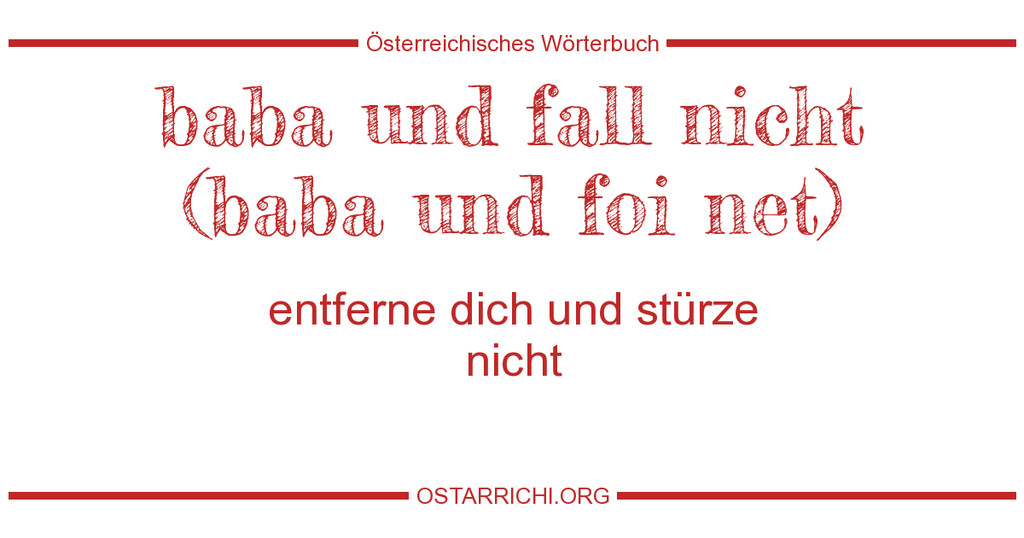
The expression "Baba und foi ned" can be used to finish abruptly a discussion, or to let someone know that one doesn't want to continue talking with him/her (Source)
We especially love "Baba". Probably this term comes originally from the word " Papa", namely "father", and was adopted to the soft Viennese pronunciation. Since the father is the head of the family, back in the days it was a custom to greet the father too when he was not present. That's how at some time "Baba" made its appearance :) "Baba" is especially used when answering the phone, and it is repeated again at the end of the conversation.
3. Leiwand
There isn't any other expression you will hear as often as the word "leiwand". It's an adjective that can be translated as the word "cool", but it's way more complex than that. It describes a psychological state or a feeling in a particular situation. When one for example describes a film as cool, that means it was good, all right. But when this film is described as "leiwand", not only was it good, but extraordinary. Not everything and everyone deserve to be called "leiwand".
Viennese people find others "leiwand" when they are funny and always have a "Schmäh" ready. For some particular people it is for this reason that the component of the humor stuck to the word "leiwand" (which is especially funny for the Viennese people).
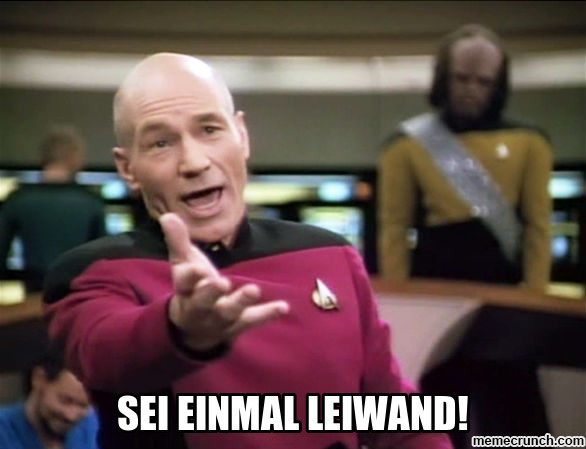
"Sei einmal leiwand" is a request caused by contradictions, to be a bit more relaxed or to join the fun (Source)
If the description of "leiwand" is not enough for you, you can say "ur leiwand", being "ur" a comparative form that undercuts additionally the degree of "leiwandity".
The antonym of "leiwand" is "zach", but it doesn't mean necessarily "not cool", and it's more used to express the reaction over an unfortunate situation. For example: "- Unfortunately I cannot come today evening because I have to work". - "Zach". It could be compared to "schade" or "blöd".
4. Oida
"Oida" is the Austrian expression for "Alter" (dude, mate) in German. It can be used both to speak to other people and as an expletive. Be careful when using it: if you say "Oida" to someone, that's not formal at all, right the contrary, it can be aggressive and could cause right the opposite.
Sometimes it's suitable as an expletive, but it doesn't correspond to the finer English way. Let's put it this way, someone from the nobler Viennese society would never use the expression "Oida". Only as slang and especially among young people is its usage spread.
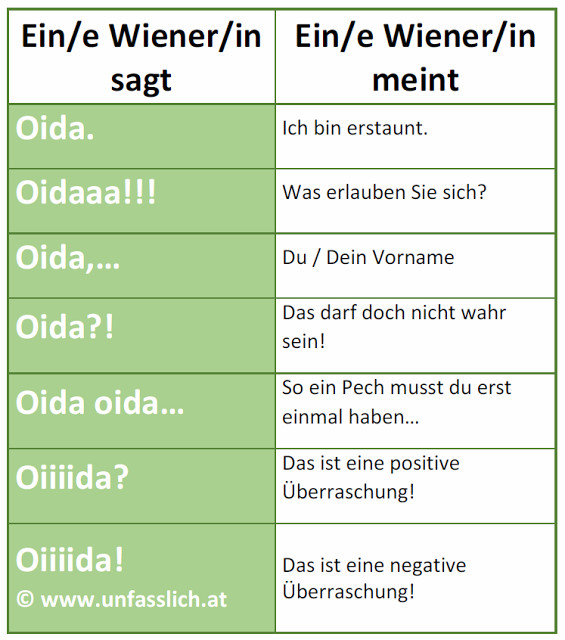
The way you are, the expression "Oida" has unbelievably numerous facets (Source)
5. Watschen
If you happen to attract unwanted attention in Viena, it can get to the point that someone shouts "Wüst a Watschen?! ", which is a rhetorical question meaning "Willst du eine Ohrfeige?! " in high German, and translated as something like "you are cruising for a bruising" in English. The Viennese population can sometimes be a bit quick-tempered, so for this reason I apologize in advance. Pardon!
In the same way, you now know when you are told "Du rüttelst am Watschenbaum" you had better retreat, since it goes as a warning meaning that you are about to add the straw that breaks the camel's back.
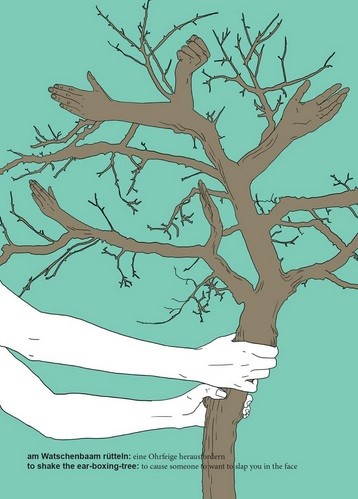
Another use for the word "Watschen" can be found in the term "Luftwatschen". And no, that's not a mimed slap. This term concerns the effect of leaving a bar drunk and facing for the first time the cool air. This effect usually strengthens the condition of drunken people, who as a result experience a "Luftwatschen" or "air-slap".
Ok dears, that's everything for our first lesson. Soon more will follow!
Photo gallery
Content available in other languages
- Deutsch: Wienerisch für Anfänger
- Italiano: Dialetto viennese per principianti
- Français: Le viennois pour les nuls
- Türkçe: Yeni başlayanlar için Viyanaca
- Español: Vienés para principiantes
Want to have your own Erasmus blog?
If you are experiencing living abroad, you're an avid traveller or want to promote the city where you live... create your own blog and share your adventures!
I want to create my Erasmus blog! →






















Comments (0 comments)